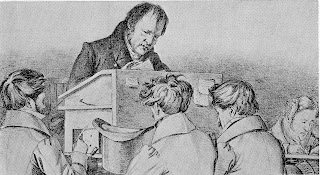Hegel’s Philosophy of History continues to bug me, because for every interesting insight it has, there’s a core concept in his philosophy that appears and annoys me. While I fundamentally disagree with his entire conception of historical progress, I must say that it’s very intriguing.
A simple, simplified, but good enough for the basics, summary of how philosophers typically think about time. You can think of one category as freedom. History is the movement of events knocking into each other, behaving according to their natures, but without any inevitability. Stephen Jay Gould’s writing about the history of evolution is probably the best modern engagement with this idea that I’ve come across. All events are contingent and could definitely have been otherwise. The material messiness of history is too great to predict any but the most simple matters, and most of these are unforeseeable accidents as well.*
 |
| Hegel was known as an immensely boring lecturer. It didn't help that his Swabian-German accent was impenetrable to most of the Berliners who took his courses, and that he had a terrible stutter. |
* I find it inescapably intriguing that so many times we try to talk about whether events unfold freely or deterministically, we end up talking about whether we can predict events. But that’s more a question of our knowledge of events, rather than events themselves. A slippery matter that I’ll definitely get back to over the course of this project.
Moving on from interruptions, asterisks, and snide remarks about terrible teaching techniques, another category of thinking about history is necessitarian. The word itself is self-explanatory. Events unfold exactly as they do, and it could not have been otherwise. Sometimes, I’ve found variants of necessitarian views of time that are teleological. This takes the necessitarian framework, and implies that the plan of historical development was seeded in the origin of the development we’re tracking.
The interesting thing with Hegel’s conception of history is that he sounds like a teleological necessitarian, but he isn’t quite. The world-spirit (the force that humans constitute through their political development, of which the discipline of history is its tracker) develops according to a conceptual structure. But it isn’t a plan, and the process of its development isn’t pre-determined or necessary. Some kind of alienation appears in society, whether it’s at the individual, community, or grander political level. The society either comes up with a negative reaction to the alienation that overcomes it, or doesn’t and stagnates.
The structure of progress is: alienation develops, is negated, a reconciled state of affairs develops, a different kind of alienation eventually appears in the new regime suited to the new context, repeat — but variantly. That conceptual framework of development is in every progressive historical movement for Hegel. But the particulars of the problems a society faces are always different, a matter of the context of the times. And a society can just as easily stagnate and fail to develop world-spirit in its appropriate direction, as it can succeed. So while progress itself has an invariant structure, whether and how it happens is changeable and contingent.
More thoughts on this tomorrow.
Adam Riggio Writes: Inevitable Alienation: Hegelian World-Spirit As History, Research Time, 20/07/2013 >>>>> Download Now
ReplyDelete>>>>> Download Full
Adam Riggio Writes: Inevitable Alienation: Hegelian World-Spirit As History, Research Time, 20/07/2013 >>>>> Download LINK
>>>>> Download Now
Adam Riggio Writes: Inevitable Alienation: Hegelian World-Spirit As History, Research Time, 20/07/2013 >>>>> Download Full
>>>>> Download LINK bZ